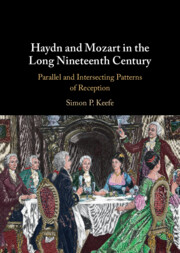208 results
18 - The Magic Flute in Biography, Criticism, and Literature
- from Part IV - Reception, Interpretation, and Influence
-
-
- Book:
- The Cambridge Companion to <i>The Magic Flute</i>
- Published online:
- 24 November 2023
- Print publication:
- 02 November 2023, pp 291-303
-
- Chapter
- Export citation
Epilogue
-
- Book:
- Haydn and Mozart in the Long Nineteenth Century
- Published online:
- 08 August 2023
- Print publication:
- 02 March 2023, pp 225-228
-
- Chapter
- Export citation
Chapter 5 - Anniversaries in Context, 1891–1914
-
- Book:
- Haydn and Mozart in the Long Nineteenth Century
- Published online:
- 08 August 2023
- Print publication:
- 02 March 2023, pp 176-224
-
- Chapter
- Export citation

Haydn and Mozart in the Long Nineteenth Century
- Parallel and Intersecting Patterns of Reception
-
- Published online:
- 08 August 2023
- Print publication:
- 02 March 2023
Chapter 3 - Anniversaries, Commemorations, Writings
-
- Book:
- Haydn and Mozart in the Long Nineteenth Century
- Published online:
- 08 August 2023
- Print publication:
- 02 March 2023, pp 86-130
-
- Chapter
- Export citation
Copyright page
-
- Book:
- Haydn and Mozart in the Long Nineteenth Century
- Published online:
- 08 August 2023
- Print publication:
- 02 March 2023, pp iv-iv
-
- Chapter
- Export citation
Chapter 2 - Biographical and Critical Narratives and Perspectives, 1811–1830
-
- Book:
- Haydn and Mozart in the Long Nineteenth Century
- Published online:
- 08 August 2023
- Print publication:
- 02 March 2023, pp 46-85
-
- Chapter
- Export citation
Index
-
- Book:
- Haydn and Mozart in the Long Nineteenth Century
- Published online:
- 08 August 2023
- Print publication:
- 02 March 2023, pp 245-254
-
- Chapter
- Export citation
Chapter 1 - Papa and the Matador, Alive and Dead
-
- Book:
- Haydn and Mozart in the Long Nineteenth Century
- Published online:
- 08 August 2023
- Print publication:
- 02 March 2023, pp 14-45
-
- Chapter
- Export citation
Select Bibliography
-
- Book:
- Haydn and Mozart in the Long Nineteenth Century
- Published online:
- 08 August 2023
- Print publication:
- 02 March 2023, pp 229-244
-
- Chapter
- Export citation
Abbreviations
-
- Book:
- Haydn and Mozart in the Long Nineteenth Century
- Published online:
- 08 August 2023
- Print publication:
- 02 March 2023, pp xi-xii
-
- Chapter
- Export citation
Introduction
-
- Book:
- Haydn and Mozart in the Long Nineteenth Century
- Published online:
- 08 August 2023
- Print publication:
- 02 March 2023, pp 1-13
-
- Chapter
- Export citation
Chapter 4 - Scholarship and Fiction in the Late Nineteenth Century, 1861–1890
-
- Book:
- Haydn and Mozart in the Long Nineteenth Century
- Published online:
- 08 August 2023
- Print publication:
- 02 March 2023, pp 131-175
-
- Chapter
- Export citation
Dedication
-
- Book:
- Haydn and Mozart in the Long Nineteenth Century
- Published online:
- 08 August 2023
- Print publication:
- 02 March 2023, pp v-vi
-
- Chapter
- Export citation
Acknowledgements
-
- Book:
- Haydn and Mozart in the Long Nineteenth Century
- Published online:
- 08 August 2023
- Print publication:
- 02 March 2023, pp ix-x
-
- Chapter
- Export citation
Contents
-
- Book:
- Haydn and Mozart in the Long Nineteenth Century
- Published online:
- 08 August 2023
- Print publication:
- 02 March 2023, pp vii-viii
-
- Chapter
- Export citation
Part III - Career Contexts and Environments
-
- Book:
- Mozart in Context
- Published online:
- 13 December 2018
- Print publication:
- 20 December 2018, pp 137-180
-
- Chapter
- Export citation
Index of Mozart’s Works by Genre
-
- Book:
- Mozart in Context
- Published online:
- 13 December 2018
- Print publication:
- 20 December 2018, pp 321-323
-
- Chapter
- Export citation
Illustrations
-
- Book:
- Mozart in Context
- Published online:
- 13 December 2018
- Print publication:
- 20 December 2018, pp viii-ix
-
- Chapter
- Export citation
Chapter 25 - Mozart the Performer-Composer
- from Part IV - Performers and Performance
-
-
- Book:
- Mozart in Context
- Published online:
- 13 December 2018
- Print publication:
- 20 December 2018, pp 213-219
-
- Chapter
- Export citation

